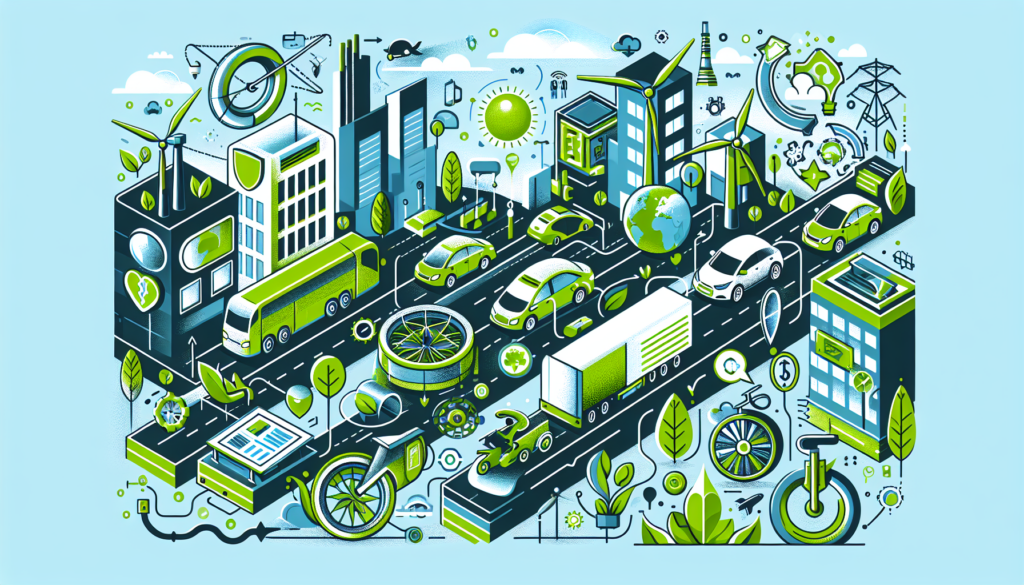The transport sector is one of the main drivers of the global economy, while also being one of the largest contributors to greenhouse gas emissions. In response, green technologies emerge as crucial solutions, appealing to innovation and sustainability as guiding principles towards an energy transition. This article delves into the technical mechanisms, practical applications, and future prospects of green technologies in the transportation industry, paying attention to the most recent trends and their long-term implications.
Electric Vehicles and Their Progressive Implementation
Electric vehicles (EV), in their various modalities – from cars to buses and trucks – are currently the standard-bearers of the transformation towards more sustainable transport. Their operation is based on electric motors powered by rechargeable batteries, directly reducing CO2 emissions compared to traditional internal combustion engines. Notable advances in energy density and the reduction of lithium-ion battery costs have been fundamental to their adoption.
Innovations in Batteries and Autonomy
Recently, research has focused on the development of solid-state batteries that promise greater capacity and safety. The implications of this technology could mark a turning point in terms of vehicular autonomy and charging times. Concurrently, the implementation of sophisticated battery management systems optimizes performance and durability of these batteries.
Advanced Charging Infrastructures
The expansion of the charging point network is imperative for the mass adoption of EVs. Technologies such as ultra-fast charging and wireless charging are under development, allowing for significantly reduced charging times and an improved user experience. Smart charging stations, capable of communicating with the electrical grid to offer optimized charging services, also integrate into this revolution.
Electrification and Hydrogen in Heavy Transport
The electrification-hydrogen duo proposes to solve the limitations of EVs in long-distance and heavy transport. While battery electric vehicles lead in short distances and medium loads, hydrogen fuel cell vehicles (FCEV) are positioned as the most appropriate for heavy and long-distance transport due to their recharge times comparable to fossil fuels and greater autonomy.
Advances in Fuel Cell Technology
The efficiency of fuel cells has experienced considerable improvements, thanks to the optimization of catalysts and the reduction in costs of materials such as platinum. Hydrogen, obtained through electrolysis using renewable energies, positions as a zero-emission life-cycle energy alternative.
Intelligent Transportation Systems (ITS) and Efficiency
Intelligent Transportation Systems (ITS) integrate information and communication technologies into traffic management and urban mobility, contributing to efficiency and emission reduction. Autonomous Vehicles (AV), which promise to revolutionize current mobility patterns, will critically depend on advances in ITS for their effective and safe implementation.
Connectivity Technologies and Big Data
The implementation of 5G networks and the advanced use of Big Data and Artificial Intelligence enhance the capacity of ITS to optimize routes, reduce travel and waiting times, and improve road safety. The integration of Internet of Things (IoT) devices in road infrastructure provides real-time data that strengthen traffic and maintenance decision-making.
Aviation and Nautical Industries in the Focus of Green Innovations
In sectors like aviation and nautical, where electrical alternatives face bigger challenges, biotechnologies and synthetic fuels emerge as promising options. Advances in the synthesis of biofuels from algae or agricultural waste and the production of e-fuels through the capture of atmospheric CO2 and its combination with renewable hydrogen offer viable paths for decarbonization of these industries.
Aerodynamic Efficiency and Eco-efficient Design
In aviation, improvements in the aerodynamic efficiency of aircraft, the development of lightweight composite materials, and the optimization of flight routes and operations are key strategies. Concurrently, the design of vessels optimized for energy efficiency along with the use of wind and solar energy as support in the nautical sector, manifest a commitment to sustainability.
The Future of Transport: Integration and Long-term Sustainability
The future vision of the transport industry closely links modal integration and system interoperability with sustainability. The synergy between different modes of transport and the integration of digital technologies encourage a more efficient and resilient mobility ecosystem. This systemic approach considers everything from light vehicles to rail networks, advocating for an inclusive policy that covers from last-mile delivery to intercontinental transport.
Transition to a Circular Economy
Adopting a circular economy model in the transport industry, where vehicles and their components are designed for reuse, repair, and recycling, is fundamental to minimize environmental impact. The implementation of retrofitting programs that convert combustion vehicles to electric and the exploration of business models based on Mobility as a Service (MaaS) reflect a paradigm shift towards integral sustainability.
Notable Cases of Transformation in the Transportation Industry
The practical implications of green technologies in the transport industry can be exemplified through pioneering initiatives and avant-garde projects, such as:
- Tesla, Inc.: Has revolutionized the automotive market with its developments in EVs and high-capacity batteries, significantly impacting market trends and consumer expectations.
- Hyundai Nexo: An FCEV that boasts one of the longest ranges in the market, demonstrates the potential for integrating hydrogen as an energy vector in personal transport.
- Waymo Project: As a pioneer in the implementation of AVs, Waymo sets a test field for the connection between autonomous technology and intelligent traffic management systems.
- Solar Impulse Project: This solar plane demonstrated the feasibility of long-distance flights using only renewable energy, marking a milestone in sustainable aviation.
Conclusion
The path towards sustainable transport is inherently complex and requires a multidisciplinary approach. Green technologies, with their technical advances and innovative applications, are leading a radical transformation that will not only impact carbon footprint reduction but will also redefine our mobility experience as a whole. The interaction between technological advances, sustainability policies, and changes in consumption patterns and urban mobility are essentially charting the course of a constantly evolving industry towards a greener and more connected future.

